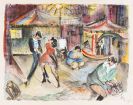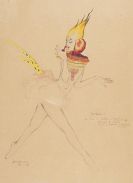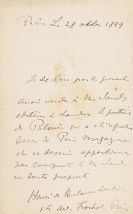
Thomas Theodor Heine
Leipzig
1867 -
Stockholm
1948
Thomas Theodor Heine's name is nowadays associated primarily with the magazine "Simplicissimus", which the artist shaped to a great extent with his caricatures. Heine's talent for drawing was evident while he was still young and his cartoons of teachers caused him to be expelled from school.
In 1884 he began to study painting at the Düsseldorf Academy under Eduard von Gebhardt and Peter Janssen. The paintings Thomas Theodor Heine did while at the Academy reveal a stylistic commitment to Impressionism. Heine moved to Munich in 1889. When Albert Langen founded a publishing house in Paris in 1893, Heine stopped working for "Die Fliegenden Blätter". Two years later he became a co-founder of "Simplicissimus" and was the chief draughtsman employed by the magazine.
Thomas Theodor Heine also illustrated books (including Hugo von Hofmannsthal's "Der Kaiser and die Hexe") and worked on books for "Die Insel" magazine. He illustrated Thomas Mann's "Wälsungenblut".
Today, however, Heine's illustrations take second place to his commercial graphics although little remains of what was a comprehensive œuvre. Thomas Heine's supreme achievement was poster design, at that time a new field of advertising. His "11 Scharfrichter" ["11 Executioners"] is only one superlative example, which ranks with the work of a Toulouse-Lautrec.
In 1922 Thomas Theodor Heine was appointed a regular member of the Prussian Academy of Art in Berlin. He subsequently showed drawings at major exhibitions (Internationale Kunstausstellung, Dresden 1926, Mánes Exhibition, Prague 1934). In later years Heine again devoted himself more intensively to painting but much of this work was destroyed in bombing raids so that it is difficult nowadays to assess his qualities as a painter.
Thomas Theodor Heine was a consummate draughtsman. Max Liebermann regarded Heine as "the greatest German draughtsman" and Lovis Corinth believed Heine "could do anything he set his mind to". Heine's versatility and prolific output exerted a profound and lasting aesthetic influence on "Simplicissimus".
During the second world war Thomas Theodor Heine fled via Prague to Oslo and ultimately Stockholm, where he continued to work productively and successfully until his death in 1948.
Would you like to sell a work by Thomas Theodor Heine?
Infos for seller




